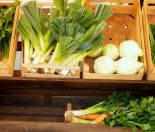Is that green as in ‘green around the gills,’ feeling ill, sick?
Or green as in immature, naïve?
Perhaps green with envy or jealousy?
Or even, gone green, mouldy or rotten?
The wonders of the English language which is often destined for misunderstanding. So, none of the above, but rather, I am going to talk about GREEN living, as in truly healthy, and with that it must be organic and sustainable.
We are often told which products are healthy for us and this is usually based on the levels of sugars, fat, salt and fibre. That’s a good place to start for a nutritional analysis but seldom featured are the levels of important vitamins and minerals. It may have even been partly forgotten we should and can be getting our valuable vitamins and minerals from food and not little brown bottles.
There has also been much debate around nutritional values of organic growing versus conventional with varying results and opinions. (Interesting for me after just writing the word ‘conventional’, how I, as with many, seem to have slipped into accepting that the 50 to 60 years of using chemical inputs in agriculture has taken on the ‘conventional’ tag where as the thousands of years of organic methods has been relegated to the abnormal or fringe. Note to self to not use the term as such).
So for me, an important factor to health and well-being is what IS NOT in the food we eat and feed our families with. I am talking about the importance of food that does NOT contain additives used in manufacture and pesticides from the growing and storage processes. Quite a lot has been said about food additives, as in food colourants and the dreaded ‘numbers’ that we should probably avoid eating. This is quite a big subject so will leave them for another day and pick up on the pesticides.
In the latest New Zealand Food Safety Authority residue tests, The Dirty Dozen was compiled where food in New Zealand with the most pesticide residues was ranked according to number of pesticides detected in total samples and percentage with pesticides. Topping the list was again Celery with 98% of samples revealing 21 pesticides. Peaches, Apricots and some dairy products were next then the largest sample size where wheat-based products (bread and all products) revealed a whopping 23 pesticides from over 79% of samples.
So are pesticides bad for humans? Are there links between pesticides and prevalent diseases like cancers and dementia? Do some people in fact have allergic reactions to the pesticides as opposed to the food?
There certainly is increasing evidence that some commonly used organophosphates can cause neurotoxic effects at low concentrations. An online report by the Cancer Society suggests that contact with pesticides should be kept to a minimum and closely monitored. “According to animal and bacterial tests, some pesticides in common use have been shown to be carcinogenic (ie they can cause cancer in animals) and, therefore, may cause cancer in humans.” (Cancer Society, 2004)
Do pesticides get into the food we eat? Well, just cast your mind back to primary school and the experiment with the bean plant in a tumbler of water with red ink- it wasn’t long before the ink was visible in the plant! To me, that shows that undoubtedly we are eating what is sprayed on paddocks and plants.
If you eat organic, you will be significantly reducing the pesticide load on your body. This is particularly so for infants and children, as they take in more food in proportion to their body weight than adults do, and they also tend to eat more of the types of food that are more heavily sprayed, such as fruit. Indeed, an American study has found that if children eat mostly organic food, then the average amount of organophosphate residues as measured in their urine is nine times lower than those children eating conventional food.
For me, Living Green means minimising the exposure and possibilities and eating organic when possible starting with your basic foods like bread milk and fruits. If you think organic food is too expensive, remember that non-organic food does not include the cost of biodiversity loss and other environmental degradation. With organic food, you pay the real cost for real food, and you give the grower a fairer return. By having organic food you support a system that better protects our children and the environment.
References
Organophosphorus pesticide exposure of urban and suburban pre-school children with organic and conventional diets. Cynthia L. Curl, Richard A. Fenske, Kai Elgethun. Environmental Health Perspectives, October 13, 2002, National Institute of Environmental Sciences, EHP Online
Cancer Society. (2004). Position Statement: Pesticides and Cancer. Cancer Society.
www.organicnz.org/soil-and-health-press/1233/nz-food-samples-still-stacked-with-pesticide-residues
http://www.organicnz.org/organic-nz-magazine/dirty-dozen






